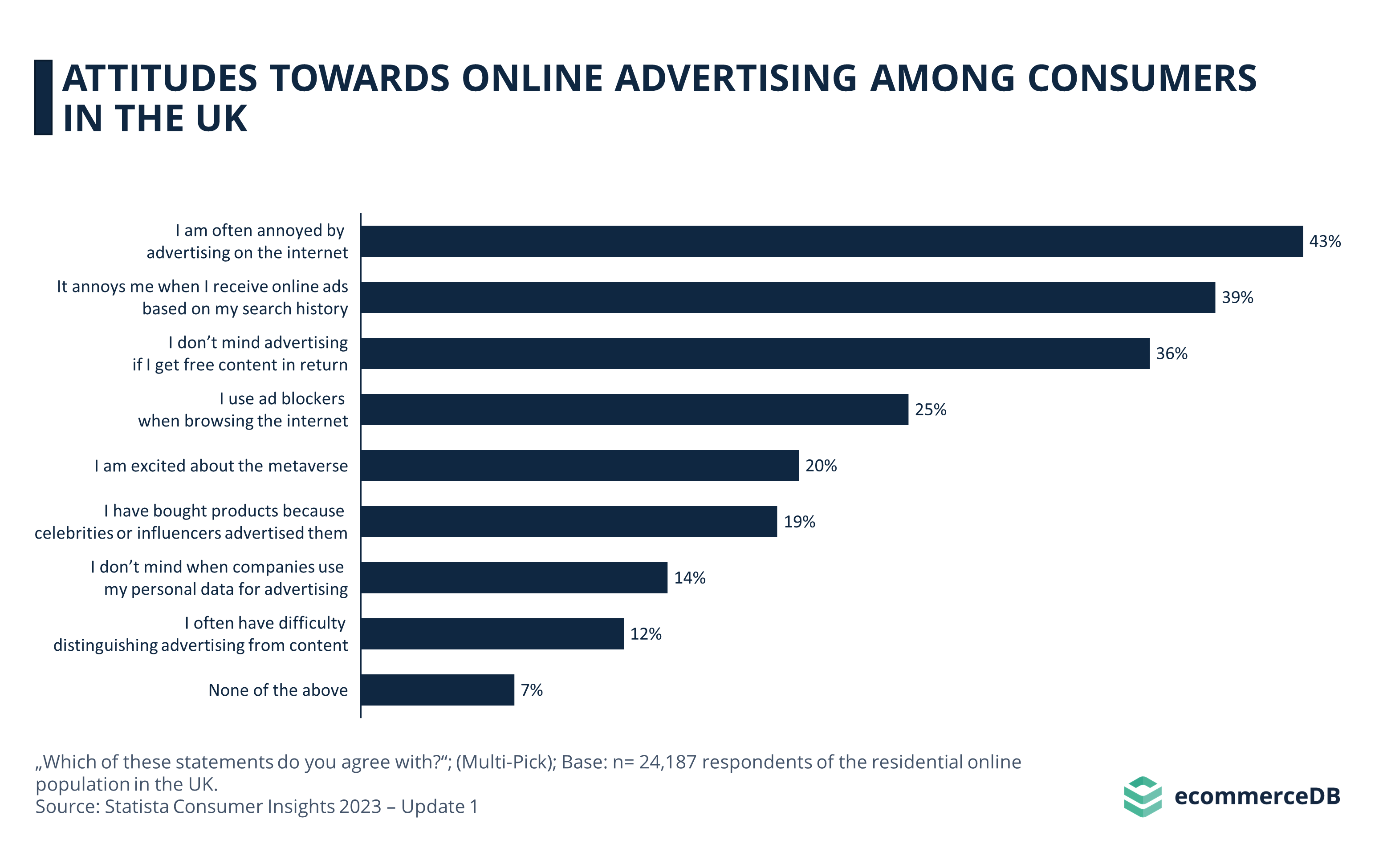Consumer Attitudes Towards Digital Advertising in the UK
Article by Nadine Koutsou-Wehling | June 27, 2023
Advertising is a pervasive phenomenon that permeates every part of our lives. No wonder that as the world spends more and more time online, advertising is accompanying our move to digital, following consumer attention wherever it goes. In the UK alone, the digital advertising market was worth £26.1 billion¹ in 2022, up from £11.55 billion² in 2017, having more than doubled in just 5 years. Unsurprisingly, this value is predicted to increase well into the future, making the advertising market a lucrative sector for businesses to engage in.
However, consumer response to advertising is often quite different from what advertisers would like. Consequently, this article examines consumer attitudes towards online advertising in the UK to find out how internet users perceive advertising and the trends that go along with it.
Advertising Is Mostly Annoying to Consumers, Although Trade-Offs Are Possible
Statista’s 2023 Consumer Insights asked shoppers in the UK for their opinions on certain statements about online advertising. The two most common responses reflect a rather unfavorable attitude: 43% of respondents said they are often annoyed by online advertising, while 39% expressed annoyance with targeted online advertising based on previous searches.

On the other hand, there is also a substantial number of respondents (36%) who said that they do not mind advertising as long as they receive free content in return. In other words, these consumers are willing to make a trade-off: instead of paying for subscriptions or content fees, they would rather spend a few seconds playing an ad, which is beneficial to advertisers in more than one-third of cases. In addition, a quarter of users avoid being exposed to online advertising by using ad blockers.
In terms of advertising trends, fewer consumers in the UK are jumping on the bandwagon. First, there is the Metaverse, Meta’s (formerly known as Facebook Inc.) immersive virtual reality space, which promises to be an advertiser’s eldorado, grabbing consumer attention at every turn if it ever takes off. 20% of UK respondents said they were looking forward to immersing themselves in this digital reality. Meanwhile, a very well-established concept in digital advertising today is influencer and affiliate marketing. 19% of users said they have bought products because an influencer or celebrity promoted them. This finding highlights the social component of digital interactions that advertisers are leveraging to draw more positive attention to their products and offer ads that are entertaining to consumers because they are watching relatable and trusted figures.
A minority of 14% of UK consumers said they have no problem with companies using their personal information to target advertising to them. This, in turn, means that there is a significant number of users who do find this practice problematic, which calls for stricter and more user-friendly privacy regulations. Clearly, businesses and consumers are at opposite ends of the spectrum when it comes to their personal interests in the individualized targeting of online advertising. Businesses can benefit by adopting approaches such as transparency advertising, which builds trust and helps consumers regain some control over their personal information.
For 12% of UK respondents to the Statista survey, it is difficult to distinguish advertising from non-promotional content. Especially when it comes to more modern forms of advertising, such as sponsored posts on social media, there are regulations in place that dictate the need for advertising labels. However, for less experienced internet users, these labels may not be easy to spot. The same is true for more subtle types of product advertising, like sponsored results to search terms on retail platforms. Finally, the smallest proportion, with 7% of users, could not relate to any of the above statements.
The UK Online Advertising Landscape: Consumer Annoyance, Ad Blockers, and the Potential of Influencer Marketing and Transparency Advertising
UK respondents to the Statista Consumer Insights survey on online advertising tend to be annoyed by advertising on the internet (43%), as well as the types of advertising that target their personal preferences (39%). However, there is also a proportion (36%) of users who are comfortable with advertising if they receive free content in return.
While 25% of UK consumers use ad blockers to prevent unwanted ads from appearing, 20% of respondents said they are looking forward to new advertising trends such as the Metaverse. A slightly smaller share of respondents (19%) has bought products because they were promoted by influencers or celebrities, highlighting the social importance of relatable and respected public figures.
Very few respondents (14%) do not mind being targeted by personalized ads, leaving a larger share of users who seem to have a problem with tracking practices, which can be addressed by adopting approaches such as transparent advertising that can increase trust and brand loyalty. Ultimately, another 12% of users have a hard time distinguishing promotional content from regular posts.
Related insights
Article
Walmart, Amazon & Shein: Which Store Ranks First in U.S. Online Fashion?
Walmart, Amazon & Shein: Which Store Ranks First in U.S. Online Fashion?
Article
Online Car Selling & Buying: Revenues, Forecast, Top Marketplaces & Trends
Online Car Selling & Buying: Revenues, Forecast, Top Marketplaces & Trends
Article
Fashion ReCommerce in the UK: Top Categories, Generational Attitudes, Leading Shops
Fashion ReCommerce in the UK: Top Categories, Generational Attitudes, Leading Shops
Article
Zalando, Otto & About You: Revenue, Market Growth, Business Strategies
Zalando, Otto & About You: Revenue, Market Growth, Business Strategies
Article
Online Shopping vs. In-Store Shopping in Europe: eCommerce Recovers After Post-Pandemic Dip
Online Shopping vs. In-Store Shopping in Europe: eCommerce Recovers After Post-Pandemic Dip
Back to main topics